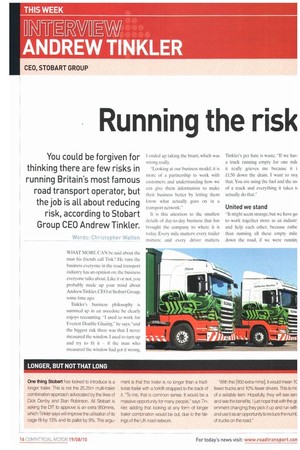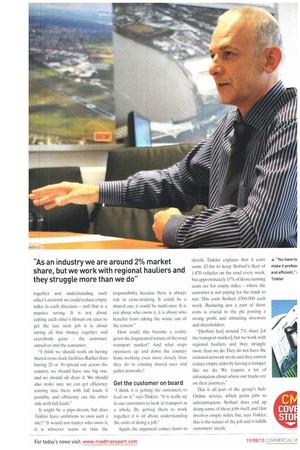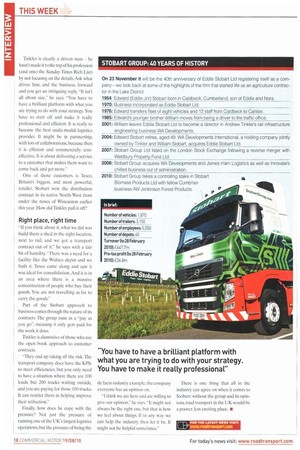Running the risk
Page 16

Page 17

Page 18

If you've noticed an error in this article please click here to report it so we can fix it.
You could be forgiven for thinking there are few risks in running Britain's most famous road transport operator, but the job is all about reducing risk, according to Stobart Group CEO Andrew Tinkler.
Words: Christopher Walton WHAT MORE CAN be said about the man his friends call link? He runs the business even,one in the road transport industry has an opinion on, the business everyone talks about. Like it or not, you probably made up your mind about Andrew Tin kler, CEO at Stobart Group, some time ago.
Tinkler's business philosophy is summed up in an anecdote he clearly enjoys recounting. '1 used to work for Everest Double Glazing." he says, -and the biggest risk there was that I never measured the window. I used to turn up and try to tit it if the man who measured the window had Rot it wrong,
I ended up taking the brunt, which was wrong really.
"Looking at our husiness model, it is more of a partnership to work with customers, and understanding how we can give them information to make their business better by letting them know what actually goes on in a transport network."
It is this attention to the smallest details of day-to-day business that has brought the company to where it is today. Every mile matters: every trailer matters: and every driver matters. Tinkler's pet hate is waste. "If we hay+ a truck running empty for one milt it really grieves me because it i £1.50 down the drain. I want to stoi that. You are using the fuel and the usl of a truck and everything it takes ti actually do that."
United we stand it might seem strange, but we have go to work together more as an industr and help each other, because rathe than running all these empty mile dow-n the road, if we were runnin;
together and understanding each other's network we could reduce empty miles in each direction — and that is a massive saving. It is not about cutting each other's throats on rates to get the last, next job it is about saving all that money together and everybody gains — the customer. ourselves and the consumer.
"1 think we should work on having shared cross-dock facilities. Rather than having 20 or 30 spread out across the country, we should have one big one, and we should all share it. We should also make sure we can get efficiency coming into there with full loads, if possible, and efficiency out the other side with lull loads."
It might be a pipe-dream, but does Tinkler have ambitions to own such a site? "It would not matter who owns it, it is whoever wants to take the responsibility because there is always risk in cross-docking. It could be a shared one, it could be multi-user. It is not about who owns it, it is about who benefits from taking the waste out of the system."
How could this become a reality given the fragmented nature of the road transport market? And what stops operators up and down the country from working even more closely than they do in existing shared user and pallet networks?
Get the customer on board "I think it is getting the customers to lead on it." says Tinkler. "It is really up to our customers to look at transport as a whole. By getting them to work together it is all about understanding the costs of doing a job."
Again, the argument comes down to details. Tinkler explains that it costs some £3.4m to keep Stobart's fleet of 1,870 vehicles on the road every week, but approximately 15% of those running costs are for empty miles — where the customer is not paying for the truck to run. This costs Stobart 1:500,000 each week. Reducing just a part of these costs is crucial to the plc posting a strong profit and attracting investors and shareholders.
"[Stobart has] around 2% share [of the transport market], but we work with regional hauliers and they struggle more than we du. They do not have the national network we do and they cannot reduce empty miles by having a tramper like we do. We require a lot of information about where our trucks are on their journeys."
This is all part of the group's SubOnline service, which posts jobs to subcontractors. Stobart does end up doing some of these jobs itself, and that involves empty miles. hut, says Tink ler. this is the nature of the job and it fulfills customers' needs.
Tinkler is clearly a driven man he hasn't made it to the top of his profession (and onto the Sunday 'limes Rich List) by not focusing on the details. Ask what drives him, and the business, forward and you get an intriguing reply. "It isn't all about size,he says. "You have to have a brilliant platform with what you are trying to do with your strategy. You have to start off and make it really professional and efficient. It is really to become the best multi-modal logistics provider. It might be in partnership, with lots of collaborations, because then it is efficient and commercially costeffective. It is about delivering a service to a customer that makes them want to come back and get more."
One of those customers is Tesco. Britain's biggest. and most powerful. retailer. Stobart won the distribution contract in its native North-West from under the noses of Wincanton earlier this year. How did Tinkler pull it off?
Right place, right time
•• If you think about it, what we did was build them a shed in the right location. next to rail, and we got a transport contract out of it." he says with a fair bit of humility. "There was a need for a facility like the Widnes depot and we built it. Tesco came along and saw it was ideal for consolidation. And it is in an area where there is a massive concentration of people who buy their goods. You are not travelling as far to carry the goods.
Part of the Stobart approach to business comes through the nature of its contracts. The group runs as a "pay as you go", meaning it only gets paid for the work it does.
Tin k ler is dismissive of those who use the open hook approach to customer contracts.
"They end up taking all the risk. The transport company does have the Kl'Is to meet efficiencies, but you only need to have a situation where there are 100 loads, but 200 trucks waiting outside, and you are paying for those 100 trucks. It can restrict them in helping improve their utilisation."
Finally, how does he cope with the pressure? Not just the pressure of running one of the UK's largest logistics operations, but the pressure of being the de facto industry example: the company everyone has an opinion on.
"I think we are here and are willing to give our opinion," he says. "It might not always be the right one, but that is how we feel about things. If in any way we can help the industry, then let it be. It might not be helpful sometimes." There is one thing that all in the industry can agree on when it comes to Stobart: without the group and its opinions. road transport in the UK would be a poorer, less exciting place. •
FOR THE LATEST HEWS VISIT:
).
www.roadtransport.com




























































































































